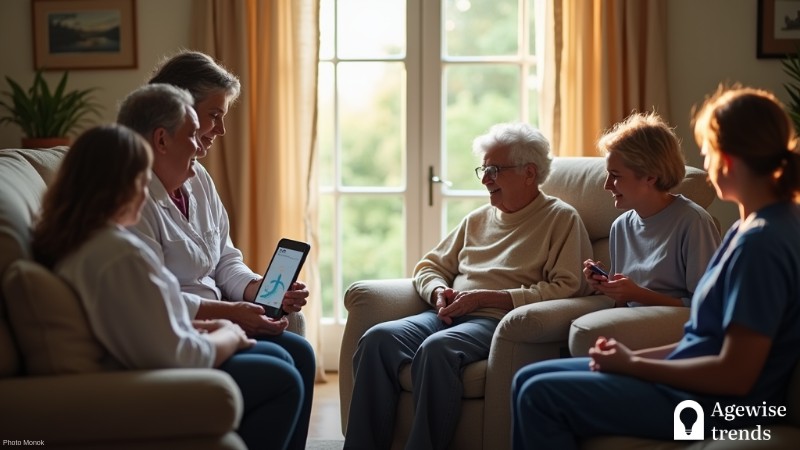Each November, the United States celebrates National Care at Home Month to honor caregivers who provide in-home medical and support services. This month is a time to recognize the dedication of home care nurses, hospice staff, and other healthcare professionals who make life better for those receiving care at home, especially seniors and individuals with ongoing health needs.
These caregivers allow people to stay in their own homes while receiving quality care and support. Supplemental Health Care (SHC), a major healthcare staffing provider, joins the celebration, emphasizing the importance of home-based care. SHC’s dedicated team focuses on delivering exceptional in-home services, a critical need given the growing elderly population in the U.S.
As more Americans age, the demand for reliable home care rises, allowing seniors to maintain independence with dignity and security. Home medical care benefits both patients and their families. Patients enjoy better health and comfort in a familiar setting, while families have peace of mind knowing their loved ones are well cared for.
Caregivers also find fulfillment in helping people stay independent and live well. Tabitha Dowd, a registered nurse and vice president at SHC, says, in-home care brings a unique sense of compassion and fulfillment.
Key Takeaways
National Care at Home Month honors caregivers who provide in-home medical and support services to seniors and individuals with ongoing health needs.
- Caregivers allow people to stay in their own homes while receiving quality care and support, promoting independence and dignity.
- Hospice care focuses on comfort, peace, and quality of life for those in the final stages of life, providing emotional and spiritual support to patients and families.
- The demand for home-based care is growing as more Americans age, with benefits including better health outcomes, reduced healthcare expenses, and improved mental health and quality of life for seniors.
Honoring compassionate hospice and palliative care
November is also National Hospice and Palliative Care Month, which emphasizes the vital role of hospice care for those in the final stages of life. Hospice care is tailored for individuals who are no longer pursuing curative treatments, focusing instead on comfort, peace, and quality of life.
Hospice providers offer critical support to both patients and their families by managing pain, alleviating suffering, and providing emotional and spiritual support. This compassionate care approach helps families and patients make the most of their remaining time together.
November is National Family #CaregiversMonth—a time to honor caregivers across 🇺🇸 for putting others' needs before their own
🤝 Thank you for all that you do!
These resources can support you in taking care of yourself and others: https://t.co/7XWxsRcnCB #FamilyCaregiversMonth pic.twitter.com/tClr9F3YfQ— SAMHSA (@samhsagov) November 2, 2024
Organizations like RiverStone Health, a community-based healthcare provider, exemplify excellence in hospice and palliative care. With over four decades of experience, RiverStone Health is dedicated to helping patients manage end-of-life care issues in a supportive, home-based environment. Their services are centered on enhancing the well-being of patients by alleviating pain and minimizing physical discomfort.
Research shows that patients admitted to hospice care earlier experience better well-being and face lower healthcare expenses, as hospice helps manage symptoms more effectively and provides comprehensive support.
Hospice care teams typically include skilled nurses, physicians, social workers, and spiritual counselors. They work collaboratively to address the patient’s physical, emotional, and spiritual needs, ensuring a dignified and peaceful end-of-life experience. RiverStone Health’s high standards in hospice and palliative care set a model for other organizations to follow, inspiring better care practices nationwide.
The growing demand for home-based care
As the number of older adults in America rises, so does the demand for home-based care. Many families prefer in-home care because it allows seniors to age in place—maintaining their independence while receiving necessary medical attention. Home health care includes a range of services, from skilled nursing and physical therapy to support with daily activities like bathing, dressing, and medication management.
For families, in-home care relieves some of the caregiving burden, enabling them to be involved in their loved one’s care without bearing all the responsibilities alone.
For example, SHC’s specialized unit helps families find experienced professionals, including hospice case managers and certified OASIS RN case managers, who can deliver top-notch care in the home setting. Through SHC partnerships, families access professionals who understand seniors’ unique needs and deliver personalized, compassionate care.
Building a supportive community network
Community-based healthcare organizations play a critical role in the overall home care system. RiverStone Health, based in Yellowstone County, is one example of a community-focused provider that reaches beyond its borders to serve surrounding areas. This organization works closely with patients and their families throughout the caregiving journey, offering a network of support that includes medical, emotional, and social services.
In addition to skilled nursing, RiverStone Health provides various forms of therapy, including physical, occupational, and speech therapy, which help patients maintain their physical and mental functions. This comprehensive approach ensures that patients receive well-rounded care that addresses all aspects of their well-being, not just their medical needs.
Family caregivers and their challenges
Families are often involved in the caregiving process, and many provide direct care for their aging loved ones at home. These family caregivers play an essential role in ensuring the health and happiness of seniors, often taking on tasks like medication management, preparing meals, and offering emotional support. However, being a family caregiver can be challenging, as it requires patience, time, and emotional strength.
Caregiving can also be stressful, particularly when family members are juggling other responsibilities, such as work and parenting. It is important to recognize the challenges that family caregivers face and to offer them support through resources, respite care, and mental health services. Family caregivers may also benefit from education and training programs, which can help them better understand how to manage their loved ones’ health needs effectively.
SHC’s commitment to caregiver appreciation
During National Care at Home Month, SHC and other organizations are holding events to show appreciation for caregivers. These events recognize the hard work and dedication of professionals and family members who provide in-home care. By appreciating caregivers, SHC emphasizes the importance of their roles in making a meaningful impact on patients’ lives. Home care providers help individuals maintain their dignity, and the efforts of these caregivers have a lasting effect on patients and their families.
In a recent statement, SHC expressed gratitude to its dedicated team, including volunteers, for their tireless work. This acknowledgment reflects a broader appreciation for the contributions of caregivers nationwide, who continue to go above and beyond to meet the needs of their patients. Recognizing caregivers is essential to building a supportive healthcare environment, where every individual involved in the care process feels valued.
In-home care’s impact on seniors and families
In-home care offers numerous benefits for older adults and their families. For seniors, remaining at home often leads to better mental health and quality of life. It allows them to maintain routines, stay connected with their communities, and enjoy a sense of familiarity that is crucial to emotional well-being. For families, in-home care provides relief from the challenges of caregiving, knowing their loved ones are receiving skilled, compassionate care.
Home care is also cost-effective. Many families find that home-based care reduces the need for frequent hospital visits, ultimately lowering healthcare expenses. Patients who receive home care also have better health outcomes, as they are less likely to suffer from infections or complications often associated with long hospital stays.
Compassionate care in action
SHC and RiverStone Health are dedicated to building a healthcare community centered on empathy, compassion, and quality. By supporting home health and hospice services, they create a caring environment for both patients and caregivers. They also encourage other organizations to uphold similar standards, helping to build a healthcare system that truly values everyone’s well-being.
National Care at Home Month and National Hospice and Palliative Care Month remind us that quality care is about more than just treatment—it’s about understanding, kindness, and respect for each person’s needs. Through their compassionate approach, celebrating organizations can show how healthcare providers can make a real difference.














